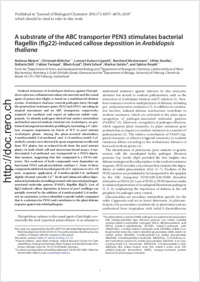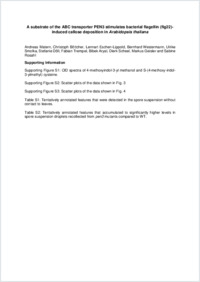A substrate of the ABC transporter PEN3 stimulates bacterial flagellin (flg22)-induced callose deposition in Arabidopsis thaliana
- Matern, Andreas Department of Stress and Developmental Biology, Leibniz Institute of Plant Biochemistry,Halle (Saale), Germany
- Böttcher, Christoph Department of Stress and Developmental Biology, Leibniz Institute of Plant Biochemistry,Halle (Saale), Germany
- Eschen-Lippold, Lennart Department of Stress and Developmental Biology, Leibniz Institute of Plant Biochemistry,Halle (Saale), Germany
- Westermann, Bernhard Department of Bioorganic Chemistry, Leibniz Institute of Plant Biochemistry,Halle (Saale), Germany
- Smolka, Ulrike Department of Stress and Developmental Biology, Leibniz Institute of Plant Biochemistry,Halle (Saale), Germany
- Döll, Stefanie Department of Stress and Developmental Biology, Leibniz Institute of Plant Biochemistry,Halle (Saale), Germany
- Trempel, Fabian Department of Stress and Developmental Biology, Leibniz Institute of Plant Biochemistry,Halle (Saale), Germany
- Aryal, Bibek Department of Biology, University of Fribourg, Switzerland
- Scheel, Dierk Department of Stress and Developmental Biology, Leibniz Institute of Plant Biochemistry,Halle (Saale), Germany
- Geisler, Markus Department of Biology, University of Fribourg, Switzerland
- Rosahl, Sabine Department of Stress and Developmental Biology, Leibniz Institute of Plant Biochemistry,Halle (Saale), Germany
-
26.04.2019
Published in:
- Journal of Biological Chemistry. - 2019, vol. 294, no. 17, p. 6857–6870
English
Nonhost resistance of Arabidopsis thaliana against Phytophthora infestans, a filamentous eukaryotic microbe and the causal agent of potato late blight, is based on a multilayered defense system. Arabidopsis thaliana controls pathogen entry through the penetration-resistance genes PEN2 and PEN3, encoding an atypical myrosinase and an ABC transporter, respectively, required for synthesis and export of unknown indole compounds. To identify pathogen-elicited leaf surface metabolites and further unravel nonhost resistance in Arabidopsis, we performed untargeted metabolite profiling by incubating a P. infestans zoospore suspension on leaves of WT or pen3 mutant Arabidopsis plants. Among the plant-secreted metabolites, 4-methoxyindol-3- yl-methanol and S-(4-methoxy-indol-3-yl-methyl) cysteine were detected in spore suspensions recollected from WT plants, but at reduced levels from the pen3 mutant plants. In both whole-cell and microsome-based assays, 4-methoxyindol-3-yl- methanol was transported in a PEN3-dependent manner, suggesting that this compound is a PEN3 substrate. The syntheses of both compounds were dependent on functional PEN2 and phytochelatin synthase 1. None of these compounds inhibited mycelial growth of P. infestans in vitro. Of note, exogenous application of 4- methoxyindol-3-yl methanol slightly elevated cytosolic Ca2+ levels and enhanced callose deposition in hydathodes of seedlings treated with a bacterial pathogen- associated molecular pattern (PAMP), flagellin (flg22). Loss of flg22-induced callose deposition in leaves of pen3 seedlings was partially reverted by the addition of 4- methoxyindol-3-yl methanol. In conclusion, we have identified a specific indole compound that is a substrate for PEN3 and contributes to the plant defense response against microbial pathogens.
- Faculty
- Faculté des sciences et de médecine
- Department
- Département de Biologie
- Language
-
- English
- Classification
- Biological sciences
- License
-
License undefined
- Identifiers
-
- RERO DOC 326709
- DOI 10.1074/jbc.RA119.007676
- Persistent URL
- https://folia.unifr.ch/unifr/documents/307898
Other files
Statistics
Document views: 126
File downloads:
- pdf: 179
- Supplementary material: 181

